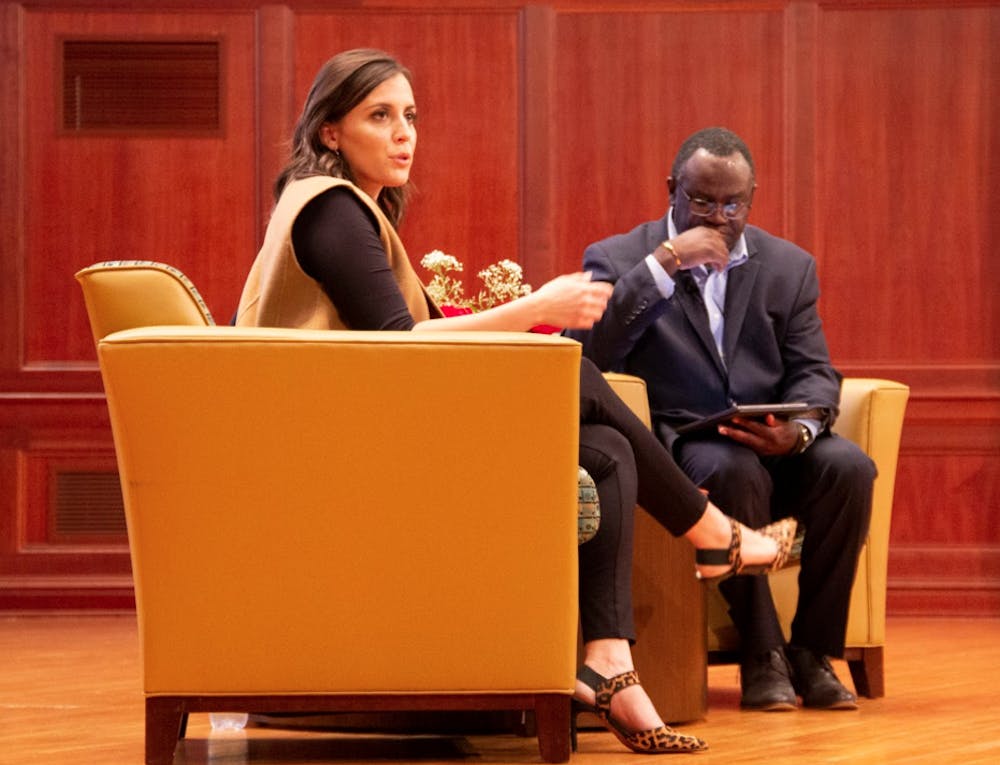By Camille Furst
Managing Editor
Every morning, Hallie Jackson stands before the White House, with the sun rising above the Washington Monument in the background and the sense of history overwhelming.
“And you just think, ‘man, this building has seen so much throughout the decades,’” she told The Signal. “And I get to work here.”
As the chief White House correspondent for NBC News, Jackson reports to the famed building every day, speaking with foreign diplomats and top officials in President Donald Trump’s administration.

But on Oct. 2, Jackson came to Mayo Concert Hall to discuss her expertise, experiences and advice with students, faculty and local community members.
She started by going back to the beginning — specifically, when she worked at WBOC TV 16, a local news station in Maryland, reporting on general assignments and any issues with local farms.
“It truly was grad school,” she said to the audience. “When you’re getting the number wrong on the acreage of soybeans at the local farm that you’re covering, it’s not quite as big a deal as messing up something about the president of the United States. So it was an opportunity to test out the kinks and go from there.”
When responding to Maurice Hall, the Dean of the School of Arts and Communications, who interviewed her at the event, she couldn’t further stress the importance of going outside one’s comfort zone.
She said she recommends sending one’s resume and clips to locations throughout the country and working in those areas a few years for experience.
“It actually can’t hurt — it’ll only make you better, and can only help you grow,” she said.
Aspiring journalists making their work known is an experience that Jackson deems invaluable. She said that by leaving the New York and Washington, D.C., “bubble,” a journalist is exposed to various perspectives held by individuals all throughout the nation.
“You see America,” she said. “Not even … on purpose, but because you have to eat dinner, (so) you go to a diner or you need to have breakfast, so you go to a coffee shop. You’re just having these interactions and these experiences very organically.”
After getting the attention from NBC News, which experienced a lack of reporters necessary for the 2016 campaign trail, she earned her way to cover the candidates and scored interviews with Trump and Sens. Ted Cruz and Marco Rubio, among others.
While she now travels less often, she would travel every day while on the campaign trail.
“I would be at 5:00 at night not knowing where my flight was at 7 p.m.,” Jackson told The Signal. “I was on the road for several weeks at a time, I’d come home to re-pack my suitcase, do some laundry and get back on the road. And that was about a year and a half of my life.”
Now being based mainly in the White House, her days consist of waking up at around 5:30 a.m. and working until 6:30 or 7 in the evening.
At the forum, Hall shifted the conversation toward journalism ethics, specifically in the context of America’s sharp partisan divides and the recent impeachment inquiry against the president.
Hall then asked Jackson for her definition of “fake news.”
“I don’t know,” she said. “You have to ask the president, because he’s the one that talks about it … I don’t connect to that phrase because I think it’s just not worthy of what we want to have a conversation about in this country.”
She described how Trump changes his perspective on what he regards as fake news depending on if it fits his agenda.
Jackson deems getting the facts right as one of the highest responsibilities as a journalist and, for her, “responsibility” is a big word.
“The stakes are really high,” she said. “This isn’t chicken farms and soybeans in Salisbury, Maryland, this is the president. This is our political world that’s happening that affects all of us.”
One of Jackson’s most difficult days as a reporter was when she interviewed the family of a 12-year-old boy who had just been killed in a car accident.
“The worst feeling as a reporter is knocking on somebody’s door and asking someone to talk to you with a camera,” Jackson said. “You talk about responsibility, there is no bigger responsibility than that.”
She advised aspiring journalists to show humanity while continuing to stay detached from the story, because “it’s not you at the center of it, it’s your team, and the story itself.”
College President Kathryn Foster reflected on the event afterward.
“It’s really exciting — it’s always exciting at the College when we bring in well-known, highly regarded professionals and have an opportunity to interact with them,” she told The Signal. “I found her warm, genuine, authentic, honest, intelligent about the issues. Just a really eye-opening very informative event.”
John O’Brien, a freshman computer science major who attended the event for a sociology class, admired how Jackson presented herself and spoke of journalism.
“It gave me a new perspective on journalists,” he said. “She was a really good speaker. I noticed she had a good presence … she was a reporter, so she had practice for it.”
In an interview with The Signal, Jackson summarized her news career and explained how she looks forward to more reporting with the upcoming election year.
“It’s a breadth of experiences,” she said. “I can’t even imagine what experiences I’ll be making as we move forward over the next year and a half.”







